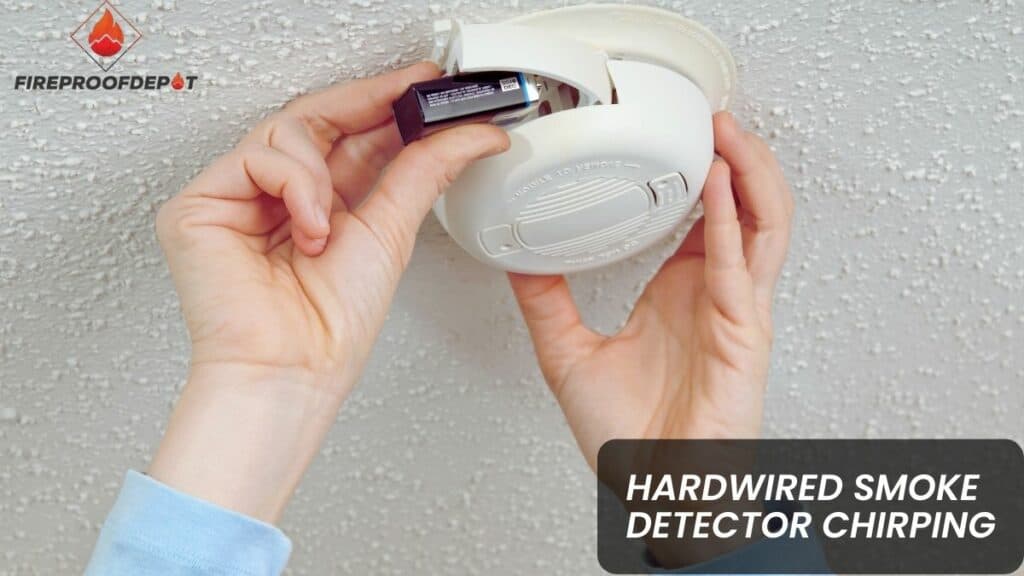In the safety-conscious world we live in, smoke detectors serve as vigilant sentinels, tirelessly guarding our homes against the threat of fire. Among these essential guardians, hardwired smoke detectors play a crucial role. Why are hardwired smoke detectors chirping?
Hardwired smoke detector chirping indicates a low battery or a malfunction. Checking and replacing the battery, cleaning the detector, and ensuring a secure electrical connection can resolve the issue. If chirping persists, professional inspection or replacement may be necessary.
You need to learn about these basic functionalities of smoke detectors to ensure the safety of your living and working place. Let me help with this.

The Reasons For Your Hardwired Smoke Detector Chirping
Understanding the reasons behind the chirping can help ensure the continuous effectiveness of these vital devices. Here are the common causes of smoke detector chirping:
Low Battery
One of the primary reasons for hardwired smoke detectors chirping is a low or failing backup battery. When the battery is running low, the detector emits a chirping sound to signal the need for replacement.
Power Disruption
If there is a power outage or an issue with the electrical supply to the smoke detector, it may trigger the chirping sound as a warning of power loss. This is crucial information for users, as it ensures they are aware of the potential temporary lack of fire detection.
End-of-Life Warning
Smoke detectors have a limited lifespan, usually around 8-10 years. As they approach the end of their service life, they automatically emit periodic chirps to signal that they need replacement. Ignoring this warning can lead to reduced effectiveness and compromised fire safety.
Dust and Debris
Accumulation of dust, dirt, or other debris within the detector can interfere with its sensors, leading to false alarms and chirping. Regular cleaning and maintenance are essential to prevent this issue and ensure the detector operates accurately.
Interconnection Problems
If one detector in a linked smoke detector system fails, all interconnected units may chirp. This feature is beneficial in alerting occupants across the entire building of potential fire hazards but can be challenging to troubleshoot when chirping occurs.
Environmental Factors
Extreme temperatures, humidity, or rapid temperature fluctuations can sometimes cause chirping in smoke detectors. Understanding the operating environment and ensuring the detectors are appropriately placed can minimize false chirping caused by environmental conditions.
Sensor Failure
If the internal sensors of the smoke detector malfunction or become damaged, the device may chirp to indicate a fault. Sensor failures compromise the detector’s ability to detect smoke accurately and should be addressed promptly.
How To Stop The Chirping?
When your smoke detector starts chirping, it’s crucial to identify and resolve the issue to ensure continuous fire protection. Here is how you can solve the problems:
| Issue | Possible Solution |
| Low battery | Replace the backup battery with a new one. |
| Power disruption | Check the electrical connections and reset the breaker if necessary. |
| End-of-life warning | Replace the entire smoke detector unit with a new model. |
| Dust and debris | Remove the smoke detector cover and carefully clean the internal components. |
| Interconnection problems | Verify all interconnected units and ensure proper wiring connections. |
How To Prevent The Chirping Of Hardwired Smoke Detectors?
Prevention is always better than cure. The same goes with false smoke detection signals. Here are the steps you can take to prevent smoke detectors chirping:
- Replace the backup battery regularly to avoid low battery chirping.
- Ensure a stable electrical power supply to the smoke detector.
- Replace the entire smoke detector unit after its recommended lifespan.
- Regularly clean the smoke detector to prevent dust and debris interference.
- Check and address any interconnection issues in interconnected smoke detector systems.
- Install smoke detectors in suitable locations, away from extreme temperatures and humidity.
- Test the smoke detector regularly to identify potential sensor failures or other malfunctions.
- Follow the manufacturer’s guidelines for installation, maintenance, and troubleshooting to ensure proper functioning.
Conclusion
Addressing hardwired smoke detector chirping is vital for maintaining a reliable and effective fire detection system in our homes. The persistent chirping often serves as a clear indication of underlying issues that require immediate attention.
